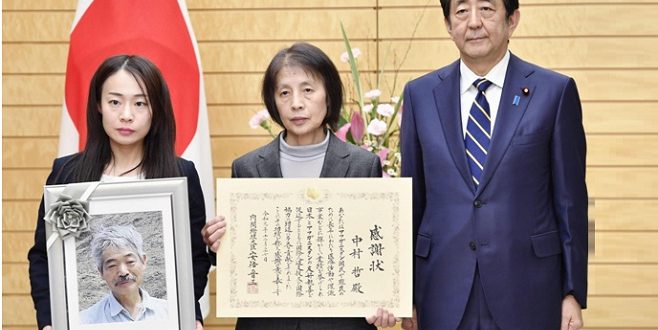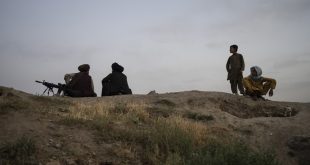“You deepened the friendly relationship between Japan and Afghanistan and made remarkable contributions to expanding humanitarian assistance and international cooperation,” Japanese PM
AT Monitoring Desk
KABUL: Doctor Tetsu Nakamura, who was killed in Afghanistan earlier this month, was posthumously awarded on Friday a decoration for his contribution to the development of the central Asian country.
Japanese Prime Minister Shinzo Abe delivered the Order of the Rising Sun, Gold Rays with Rosette, and a letter of appreciation to Nakamura’s widow, Naoko, during a ceremony at his office in Tokyo.
The 73-year-old doctor and five Afghans were killed as armed men attacked their vehicle in Jalalabad in the eastern province of Nangarhar on Dec. 4. He was head of the Peshawar-kai aid group based in Fukuoka.
Nakamura had been providing medical aid to the Afghans for years. He was also involved in tree-planting activities and a project to improve water supplies to poverty-stricken areas after a drought hit Afghanistan in 2000.
Naoko Nakamura said her husband’s death was “truly regrettable and disappointing.” But she also told reporters at the Prime Minister’s Office, “I hope there will be more green land in Afghanistan.”
Their daughter Akiko, who also attended the ceremony, said the letter gave encouragement to the Peshawar-kai, which will continue to operate after Nakamura’s death. “It’s my father’s wish and that of our family that it will carry on,” she said.
Afghan Ambassador to Japan Bashir Mohabbat and Peshawar-kai Chairman Masaru Murakami were also present at the ceremony.
The Gold Rays with Rosette is the fourth-highest of six decorations in the Rising Sun order awarded for achievements in international relations and other fields.
 Afghanistan Times
Afghanistan Times




